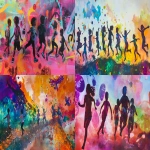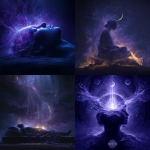Explore the Best AI Image Gallery

Navigating the Future: AI Images in Marketing
In the digital age, marketing is continuously evolving, and the introduction of AI-generated images has emerged as a powerful tool that can significantly enhance brand communication and engagement. As businesses strive to capture the attention of consumers, leveraging artificial intelligence is no longer just a trend but a necessity. In this blog post, we will explore the impact of AI images on the creative industry, their potential uses, ethical considerations, and future trends.
The Impact of AI Images on the Creative Industry
The infusion of AI-generated images into marketing strategies is transforming how brands are perceived and how they communicate. In recent years, we have seen a shift towards personalized content that resonates with target audiences. AI algorithms can analyze consumer data to create images that not only align with specific demographics but also evoke desired emotional responses.
For instance, platforms such as Canva and Adobe Sensei have integrated AI technologies that allow marketers to generate tailored visuals rapidly, enhancing productivity and creativity.
Potential Uses of AI Images in Marketing
A myriad of applications exists for AI-generated imagery in marketing:
- Social Media Content Creation: Brands can utilize AI to create eye-catching visuals for social media posts, ensuring a consistent aesthetic that captures audience interest.
- Ad Campaigns: AI can generate diverse ad creatives, helping marketers to A/B test different images to find which one performs best, optimizing their campaigns for higher conversions.
- Product Visualization: For e-commerce businesses, AI images can assist in visualizing products in different contexts or styles, enhancing the online shopping experience.
- Brand Storytelling: AI can help in creating visuals that align with brand narratives, making it easier to convey messages that resonate with consumers.
Ethical Considerations
Despite the benefits of using AI-generated images in marketing, there are ethical considerations that must be addressed. One significant concern is the issue of authenticity. With the ability to curate perfect images, there is a risk of creating a false representation of a brand or product:
- Manipulation of Perceptions: AI-generated images can be modified to enhance or alter reality, raising questions about what is real versus what is fabricated.
- Copyright Issues: As AI can learn from vast datasets of images, concerns arise about copyright infringement and the ownership of generated content.
- Job Displacement: The rise of AI in marketing may threaten traditional jobs within the creative industry, prompting discussions about the role of human creativity in a technology-driven world.
Future Trends in AI Images and Marketing
Looking ahead, the role of AI images in marketing will likely continue to grow and evolve. Here are some trends to watch:
- Augmented Reality (AR) and Virtual Reality (VR): The integration of AI with AR and VR technologies will create immersive experiences, allowing brands to interact with consumers in new and engaging ways.
- Enhanced Personalization: AI's abilities to analyze consumer behavior will lead to even more sophisticated personalization, enabling brands to deliver content tailored to individual preferences.
- Sustainability in Marketing: As more consumers demand ethical branding, AI can play a role in promoting sustainable practices by creating eco-friendly images and campaigns that highlight sustainability efforts.
- Collaboration Between Humans and Machines: Rather than replacing human creativity, the future will likely see AI acting as a collaborator, providing inspiration and efficiency to human designers.
Conclusion
In conclusion, AI-generated images are not just reshaping marketing strategies; they are fundamentally altering the creative landscape. As businesses adopt these technologies, the implications for brand identity, consumer engagement, and ethical practices will be profound. Marketers must navigate this evolving terrain thoughtfully, balancing innovation with authenticity, to leverage AI's full potential while fostering trust and creativity.




](https://images.ai-img.art/thumbnails/150/44b76c49c47b4c47f13eac7883c63827d3f89aa77fe64ce0cbecb9d3ce434499.webp)








](https://images.ai-img.art/thumbnails/150/47d44e177f427ea6b32f96ea225db96c5158850a0cf01d1bad93e45dd4594430.webp)






](https://images.ai-img.art/thumbnails/150/c2241c1eabdcb7b9a98be19a7e8d850b6cffe0e0c91c1ccda8dd807e2a96b187.webp)




](https://images.ai-img.art/thumbnails/150/c48401bc3fad7ff7f2dbd37b894d3f53cb42d5072dfacb8bfdcdeeef28a29b04.webp)

















](https://images.ai-img.art/thumbnails/150/09ccae5e68e2b6da6b5da87ef69f7eb09e80c99ca39ba886c5c3773cbb3b89ba.webp)





